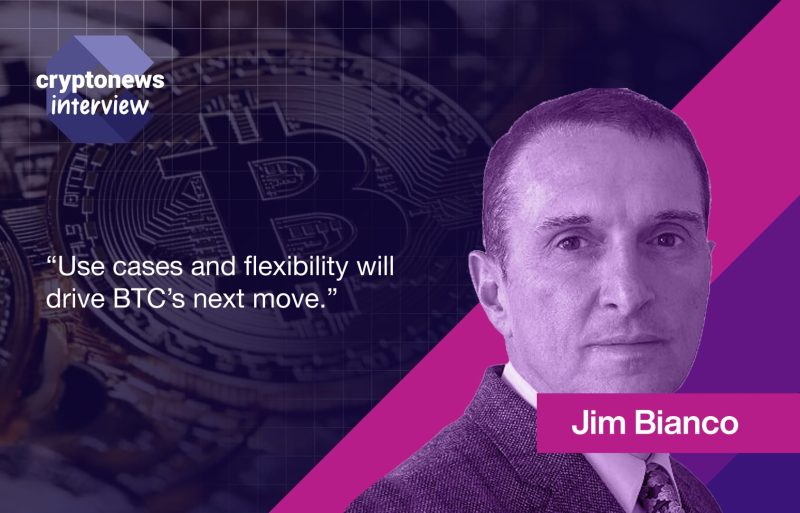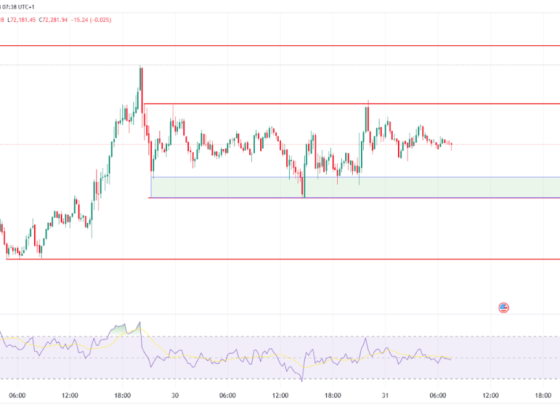With the 2024 U.S. presidential election approaching and Bitcoin’s price surging, there’s plenty for crypto investors to keep an eye on. Cryptonews spoke with James Bianco, President and Macro Strategist at Bianco Research, to discuss what could happen to crypto if Trump wins, what Bitcoin really needs to hit $100K and beyond, and what investors can expect in 2025.
Cryptonews: Has 2024 marked a true redemption for the crypto market after the turbulence of previous years, or are we still facing critical challenges?
James Bianco: I’d say it’s somewhat a redemption from previous years, mainly due to the successful launch of the Bitcoin ETF. However, I’d question the level of adoption it’s brought, as most of it has been people moving from cold storage wallets or centralized exchanges like Kraken, Gemini, or Coinbase to regulated accounts to buy the ETF. There hasn’t been net new money in that type of transaction. But there’s been some adoption that has come along because of that. So, it has helped push prices near $70,000, with a high back in March at $74,000.
However, for Bitcoin to reach the next level, like $100,000 or more, it doesn’t just need adoption; it needs development. It needs more use cases and flexibility. I hate to say it because I know there are a bunch of maxis in the world who can’t think straight, but Bitcoin needs to be more like ETH, offering more things to do with it. Look at Polymarket, the election betting site. If we see things like that, I believe that’s what will drive the next move.
While 2024 has been somewhat successful, it hasn’t been completely so. But a fully successful year could still be ahead.
Crypto to Be Independent of Traditional Markets
CN: The possibility of a U.S. recession has loomed large. Do you think we’re heading toward a full-blown recession, or can the economy achieve a soft landing in 2024?
J.B.: No, I think it’s the opposite. A recession is essentially off the table for the U.S. economy. The debate now is between a soft landing and, to use an airplane metaphor, a “no landing”—meaning the economy continues to grow at full potential. I’m in the no-landing camp, and more people are coming to that view. The problem might be that the U.S. economy could grow too fast, creating inflation. That’s why interest rates have risen since the Federal Reserve cut rates. The market’s signaling that these cuts weren’t necessary, that they’re overstimulating an economy that doesn’t need it. So, unlike economies in Europe, Japan, and Australia, the U.S. doesn’t have a problem—and because of that, the real concern might be renewed inflation.
CN: And how do you think crypto markets will react to it? Will it follow traditional markets down, or could it serve as a hedge?
J.B.: Unfortunately, I think crypto markets still follow traditional markets—they’re like a leveraged play on the Nasdaq or S&P, probably closer to the Nasdaq. They’re viewed as instruments of technological change and speculation.
For crypto to be more successful, it needs to break away from that relationship. As I mentioned earlier, the way it will get there is through development, use cases, and something that can stand alone, being able to say, “We can do this and this for you regardless of what the economy is doing, regardless of what traditional financial markets are doing.” Ultimately, adoption is what will drive crypto.
I like to joke, and maybe I’m not joking, that Bitcoin is trying to position itself as another version of TQQQ, the triple-levered Nasdaq 100 ETF. And that will not be successful for Bitcoin at the end of the day. What it really needs, in my opinion, is to be zero correlated to TQQQ—not highly correlated to it as it has been for the last several years. The way it will get there would be with more use cases and more development.
What Happens if Trump Wins the Election?
CN: With the 2024 U.S. elections approaching, how do political outcomes affect the broader financial markets and crypto regulation?
J.B.: Let’s start with crypto markets and regulation. For better or worse, Bitcoin—the “orange coin”—has now attached itself to the “orange man.” When Donald Trump spoke at Bitcoin Nashville in June to a standing ovation, Bitcoin became a partisan coin. I know some people don’t like to hear that, but you could see it in the way the betting markets on the election trade if you overlay it with Bitcoin or with Trump media stock. Bitcoin moves up and down with it. So, even though you’d argue it should be nonpartisan, it’s now highly invested in a particular outcome.
Now, there’s a good reason for it to be a partisan coin. It’s very clear that the Democratic Party is anti-crypto, and the party isn’t showing any signs, or very few signs, that it’s going to embrace crypto. I think they’re whispering something nice about crypto into people’s ears. Let’s see if they still believe in it after the elections. I have my doubts.
Bitcoin has rallied about $10,000 in the last 10 days as Trump’s lead in the polls has grown, so it’s already benefiting. That could reverse, but for now, he’s over a 50 percent chance of winning and in an uptrend.
For the broader economy, a Trump victory could intensify the “no landing” scenario I mentioned earlier. He would likely stimulate an already strong economy, which could spur even more inflation.
Something unusual has been happening. The Federal Reserve cut interest rates on Sep. 18. The 10-year yield in the United States has risen by six-tenths of a percent, or 60 basis points, in the next month. That’s the biggest rise in the 10-year yield in the first month after the Fed started cutting rates in at least 40 years. This isn’t normal.
Why’d that happen? Because the economy doesn’t need the extra stimulus. But it’s getting stimulus from the Fed. Now, it might get extra stimulus from Donald Trump coming in, cutting taxes, and really starting to push the economy by reducing regulations and doing other pro-growth things. Add on his keen interest in imposing tariffs, which raise costs on imports—a form of inflation—and you can see why I think the real fear in the U.S. isn’t a recession. It’s the opposite: we might grow too fast, causing inflation, which is why interest rates are rising to reflect that reality.
CN: Do you think if Trump wins, crypto will be in high demand as an investment, and adoption will rise with more people eager to adopt?
J.B.: I think you’ll see adoption and people move towards crypto if Trump wins. It will open up the United States to being more crypto-friendly. Developers will develop, and new apps will come out, like the Polymarket app. With more tools, more applications for crypto will become prevalent in the United States. Developers won’t have to be afraid of going to jail because of some code they wrote, and I think that would be hugely beneficial to crypto if we see a Trump victory. I don’t expect that kind of embrace from crypto if we get a Harris victory.
Is Crypto Losing Its Appeal in a High-Yield Market?
CN: As bond yields rise, do you think crypto remains an attractive alternative for investors, or is it losing its appeal in a high-yield environment?
J.B.: I think the second half of your question is telling. Right now, traditional markets are offering people lots of alternatives. Let’s use Bitcoin as an example. It peaked in March, fell by a third, and is now about 15% or 10% below its all-time high. Since March, gold has been up 25%, stocks have risen significantly, and the bond market had a big rally, although it’s somewhat reversing over the last few weeks.
Bitcoin and traditional assets ROI. Source: CasebitcoinTraditional markets present a compelling alternative to crypto. Crypto offers a hedge, but the problem is that the case for gold, bonds, and stocks has been stronger for the last six months, especially the last three. Crypto has largely relied on political factors lately, like “the orange coin attached to the orange man.” That’s what’s been driving its rally for now. I’m not diminishing crypto’s potential, but if I were to tell a wealth manager to buy crypto as a hedge against bad events, they’d probably respond, “Yes, but so is gold. And gold’s up 30% while crypto is down.”
This doesn’t mean crypto won’t become a compelling case in the future. Goldman Sachs, for example, recently suggested that the stock market may only offer a 1% return over inflation for the next decade, which could mean just a 4% return if inflation stays around 3%. Of course, it’s a prediction. Nobody knows what it will be. But they make a compelling case. If returns in the stock market remain low, then something like Bitcoin or any other crypto would become a very attractive alternative.
But when the stock market is up 20–25%, and AI stocks and the Magnificent Seven stocks double within less than a year, it’s difficult for anyone to justify choosing anything else over these stocks. But maybe that trend is coming to an end.
‘Crypto Adoption Will Start Outside the Developed World’
CN: Looking beyond 2024, what key trends do you see shaping the future of crypto in 2025, particularly about market regulation and institutional adoption?
J.B.: As I’ve mentioned before, the big focus is development, applications, and use cases. I can’t stress enough that this is the key. It’s nice that Bitcoin is digital gold, a store of value—that’s what got it from nothing to a trillion dollars. But it needs a real use case to take it to the next level whether that use case comes from other crypto or the Bitcoin blockchain, wherever it comes from, as long as it’s decentralized and permissionless.
I do hope the industry is focusing on this direction. If the strategy is simply waiting for all the boomers to put 5% of their retirement money in a Bitcoin ETF, we will be waiting a long time. What would get them to invest 5% is showing them what they can do with it. That’s really where the appeal will come from.
The other trend is crypto’s adoption as a medium of exchange likely starting outside of the developed world. The financial system’s apex predator is the U.S., specifically places like the Greenwich Country Club, where hedge fund managers operate. They don’t need permission or crypto wallets—they’ve got U.S. dollars in a regulated bank with the rule of law behind them. They’re going to be the absolute last place you’re going to get to adopt crypto.
You’re going to get the crypto adoption from Asia, Africa, and the Middle East, where they have shaky currencies and uncertain financial systems. It will become their medium of exchange, and as they start to use it, it will then come toward the developed world. From 2025 on, we should not be looking for the Greenwich Country Club to lead the way in adoption by buying Bitcoin in an ETF. They’ll be the last to adopt it. When they finally do, that’s when we’ll know the story of crypto adoption is complete, not when it starts.
CN: Any tips for investors? Anything they should look forward to?
J.B.: For investors, not traders, here’s the key tip: Bitcoin and crypto are highly volatile assets, with the big promise of creating an alternative financial system—one that’s permissionless and decentralized. In a world where many banks and governments manipulate currencies and control people’s money, Bitcoin offers a form of ownership that’s untouchable. But getting there won’t be easy; it’ll be a very volatile journey. Look at Bitcoin since it started trading in 2009. Losing 80 or 90 percent of your investment before it reaches another all-time high is part of the process.
Be financially prepared to invest in an asset that can fluctuate this dramatically but also has the potential to be very rewarding if it fulfills its promise of creating a new alternative financial system—a system that billions outside the developed world desperately need.
The post James Bianco: ‘Bitcoin Needs More Than Just an ETF to Reach $100K’ appeared first on Cryptonews.


